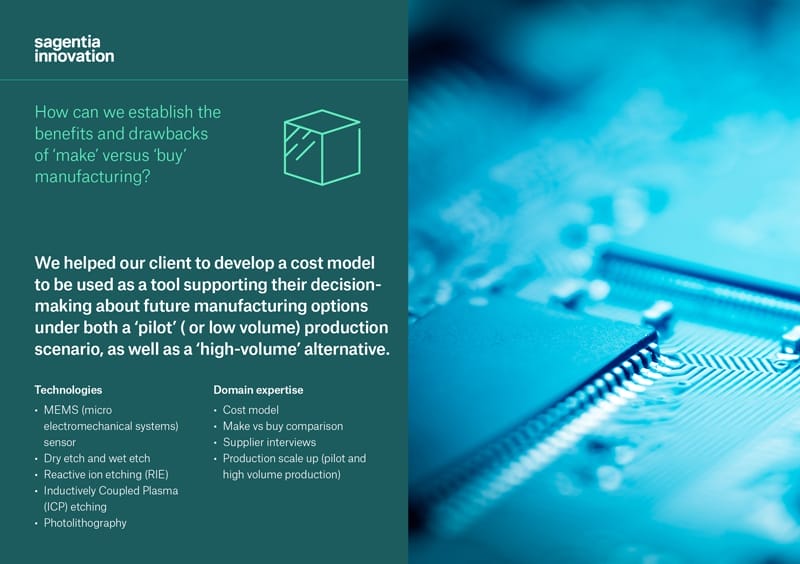How can we establish the benefits and drawbacks of ‘make’ versus ‘buy’ manufacturing?
We helped our client to develop a cost model
to be used as a tool supporting their decisionmaking
about future manufacturing options
under both a ‘pilot’ ( or low volume) production
scenario, as well as a ‘high-volume’ alternative.
Our client asked:
Our client was developing a Micro Electromechanical Systems (MEMS) sensor device –
currently at the prototype phase – and wanted to start scaling up production using in-house
resource, rather than a third-party manufacturer.
Understanding the economics of such as decision – in particular, which machines would be
most cost-effective for producing different volumes of devices – was vital.
Our client also wanted to understand the capital and operating costs of the required
machines, and the levels of output which diverse types of machines could deliver.
The project story:
We started the project by holding a workshop with the client to understand their requirements.
We then developed a cost model in Excel based on these requirements, populated with
data derived from a variety of sources – including supplier interviews, third party data
sources and in-house experience from our sister company Frontier Smart Technologies.
We focused on two scenarios in the model. Scenario 1 was a ‘pilot’ scenario, producing 500
wafers per week, while Scenario 2 involved ‘high-volume’ production of 5,000 wafers per week.
Results: deliverables and outcomes
Our client was able to understand the costs associated with a range of MEMS
manufacturing options – ‘make’, ‘buy’, and a hybrid of ‘buy’ and ‘make’ – as they began
to scale up production.
The key output from this work was a cost model – which we handed over to the client –
that could be used as a tool to support decision making about its future manufacturing
options.
This deliverable was designed to help our client understand how the choice of
manufacturing process – and associated costs – evolve as different volume thresholds
are achieved, using both ‘pilot’ and ‘high-volume’ production.

Our markets

Our consultants, scientists and engineers redefine what’s possible and help R&D groups across the medical, industrial, consumer and food and beverage sectors achieve commercial return from their opportunities.
Our projects

We have completed over 10,000 projects for start-ups and global market leaders alike, from understanding the market & technology landscape through to developing and delivering complex products.
